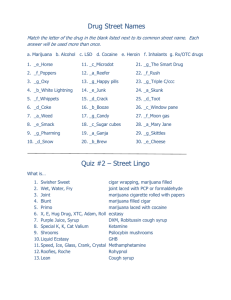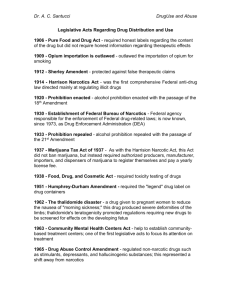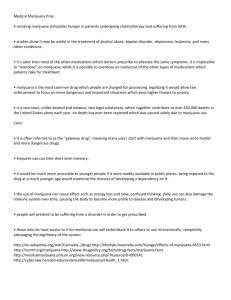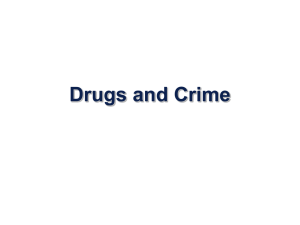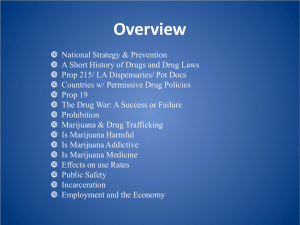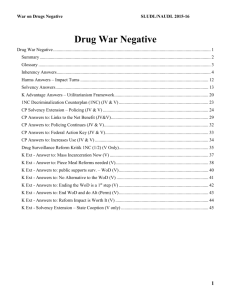America*s War on Drugs - Garrett's E
advertisement
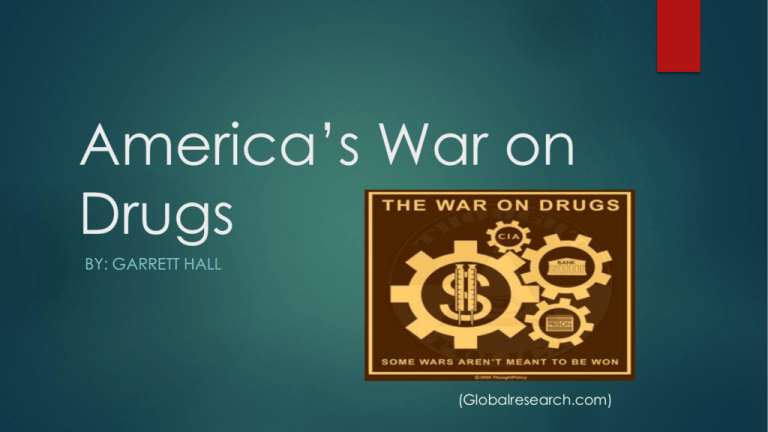
America’s War on Drugs BY: GARRETT HALL (Globalresearch.com) Facts on The War on Drugs More than $51,000,000,000 spent annually in the U.S. Number on arrests in 2012 for nonviolent drug charges: 1.55 Billion Number of people arrested for a marijuana law violation in 2012: 749,825 Number of those charged with marijuana law violations who were arrested for possession only: 658,231 (88 percent) Number of Americans incarcerated in 2012 in federal, state and local prisons and jails: 2,228,400 or 1 in every 108 adults, the highest incarceration rate in the world Proportion of people incarcerated for a drug offense in state prison that are black or Hispanic, although these groups use and sell drugs at similar rates as whites: 61 percent (aliexpress.com) (caribpress.com) History of Drug Prohibition in U.S. 1880 – Regulation of pharmaceuticals 1906 – Pure Food and Drug Act 1914 – Harrison Narcotic Act 1919 – Alcohol Prohibition 1937 – Marijuana Tax Act 1970 – Controlled Substances Act (CSA) * Schedule of controlled substances. A Hidden Government Agenda: Propaganda Exposed “The Yellow Menace” (thedea.org) “Reefer Madness” (dailymail.com) Criteria for Schedule of Controlled Substances (dea.gov) Schedule of Controlled Substances (uspharmacist.com) Do Lawmakers Want Reform? Many believe that lawmakers do not want drug prohibition reform because the current system in place is profitable for the government. The war on drugs also creates a need for many careers in government agencies involved in enforcing drug laws. Private prisons are extremely profitable; in fact, they are the largest growing industry in the country. In order to build more prisons, you must create a demand for more prisons. Did I mention the U.S. has the highest incarceration rate in the world? (1/108 adults) Have we not learned anything from alcohol prohibition? Everyone already knows alcohol prohibition was a failure. (That’s why it ended!) Drug prohibition is following the same path. The alcohol trade’s only hindrance: The illegality of alcohol made the alcohol trade more secretive. (organized crime) Smaller containers had to be transported to avoid detection, which introduced more potent substances, like moonshine. Likewise, the drug prohibition has resulted in more usage and distribution of potent and dangerous drugs. (crack cocaine) (huffingtonpost.com) (brainyquote.com) A Poem for Perspective A drug-free America, even if we Take away all of your rights to be free. Protections of privacy, gone by the way; Oppression is really a small price to pay For knowing your family is safe and secure From dangerous drugs and their deadly allure. Drugs that are evil, Satan's own kind, Possessing your soul, your heart and your mind. We know it's a lie, but we'll never back down; No matter the cost, we won't be turned around, For we have no courage, no conscience, no heart, To undo the damage done; no place to start. Our make-believe war has become the real thing, With all of the suffering that real wars can bring. Our power is awesome; our brotherhood strong; If you stand against us, you won't stand for long. The fear we instill in your family and friends Will cause them to scatter, like dust in the wind. Violent drug raids put your children in danger; We'll take them away and we'll give them to strangers; Then we'll blame the loss of the ones that you love. On evil, illegal, dangerous drugs. (stopthedrugwar.org) What needs to change? Drug addictions need to be treated like the disease that they are. Locking people up for a having a disease is incredibly counterproductive to helping them. The U.S. needs to look to other countries that have already begun treating this issue accordingly like Portugal. Money that is currently spent on the war on drugs could be redirected to what I call “the war on addiction.” (addictionsearch.com) The Benefits of Legalization, Regulation, and Taxation It seems like a more than reasonable proposition that drugs be legalized and regulated for US citizens over the age of 18, or 21. If this were to happen, over $40 billion would be saved by the United States annually. $32 billion would also be profited from tax money. This cumulative $72 billion per year can be used to improve our countries education system, infrastructure, and focus on citizens who really need this money. Colorado and Washington have already legalized the recreational use of marijuana. More recently, Oregon, Alaska, and Washington D.C. have also legalized marijuana. How marijuana legalization in Colorado and Washington has worked so far… Crime rates have lowered, as expected; if you make things legal that were previously illegal, this will happen. DUI rates have not increased. Black market, or selling marijuana without proper licensing has increased partly due to the high taxed imposed on marijuana in the states. (thebottomline.com) Mapping Progress: Marijuana laws by state (rollingstone.com) Hope for The Future If more states continue in legalizing marijuana, hopefully this will prompt lawmakers and voters alike to change federal laws once they see there is more good than harm coming out of legalization. The money generated from taxes will be utilized in schools, infrastructure, and programs to help people struggling with drug addiction. Works Cited http://thedea.org/prohibhistory.html http://www.globalresearch.ca/americas-war-on-drugs-has-triggered-ahumanitarian-crisis-in-central-american-children-converging-at-the-usborder/5390491 http://www.drugpolicy.org/ http://stopthedrugwar.org/speakeasy/2007/jul/12/poem http://www.cato.org/publications/policy-analysis/alcohol-prohibition-was-failure http://www.drugwarfacts.org/cms/Causes_of_Death#sthash.sIiOXZM5.dpbs http://www.drugfree.org/join-together/u-s-looks-to-other-nations-for-addictiontreatment-ideas-kerlikowske/ http://www.drugabuse.gov/publications/drugfacts/treatment-approaches-drugaddiction http://www.washingtonpost.com/blogs/wonkblog/wp/2014/10/17/how-marijuanalegalization-in-colorado-and-washington-is-making-the-world-a-better-place/ http://www.huffingtonpost.com/2014/09/22/legal-marijuana-taxes_n_5863860.html

![[H1]Researching Society with MicroCase Online](http://s3.studylib.net/store/data/007737973_2-9d35b9e42208c660471ccaa373bd3b78-300x300.png)
